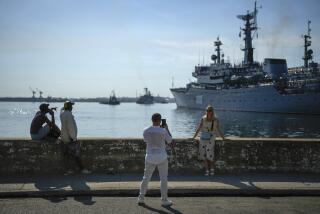CUBA / RUNNING OUT OF OPTIONS : Peacetime Havana Takes War Stance in Cash Crunch
- Share via
HAVANA — After months of scurrying around the world in search of hard-currency deals to shore up a crumbling economy, Cuban trade delegations are returning to Havana mostly empty-handed, suggesting that even with continued Soviet support, Fidel Castro’s doggedly orthodox communism will not survive the radical transformations of his former East Bloc trading partners.
“The situation is getting worse and is going to get a lot worse,” said a foreign diplomat with long experience here. “In the next year or two, Russian subsidies will fall by at least a third. Eastern European trade is dwindling toward zero, and they can’t get credit in the West because they haven’t paid any debt service for two years.”
Cuban and Soviet officials have tried to put the best face on the situation, portraying the politically and economically isolated island’s problems as temporary during a period of readjustment.
But even Castro has acknowledged his country’s difficulties, ordering a crash program for survival that he euphemistically calls “a special period in normal times,” translated here as “war footing in peacetime.”
Signs of wartime-like austerity and shortages already are visible in Havana:
The absence of spare parts for rickety Czechoslovak and Hungarian buses has cramped public transportation so much that many workers have been unable to reach their jobs. Both the former East Bloc countries now want hard currency for spare parts, and Cuba’s foreign exchange reserves are already perilously low, according to foreign economists here.
Power blackouts and dimouts have become more frequent as the result of government moves to stockpile oil against the day when the Soviets begin to trim the 13.3 million tons they presently ship each year.
In a nation plagued by food shortages, even small comforts such as the once-ubiquitous glass of Cuban beer are in short supply. Barley shipments stopped when trade with Czechoslovakia literally dried up last spring, seriously affecting Cuban breweries.
Even simple electrical goods such as Russian light bulbs, plus refrigerators, TV sets and more sophisticated equipment, have vanished from the shelves. Soviet officials here say shipments have ceased because their own people need the goods at home.
“We have to prepare for the worst-case scenario so that we are ready for any eventuality,” acknowledged Cuban Finance Minister Rodrigo Garcia, explaining the “special period” measures to foreign journalists recently.
The worst case, cited often by Cuban officials, would be a sweeping “ruralization” of the population, a drastic solution tried most recently by the bloody Pol Pot regime in Cambodia in the 1970s. People would be moved in vast numbers to the countryside to spur agricultural production and shorten food supply lines. Diplomats estimate that almost a third of fresh produce bound for city markets spoils due to bad management and lack of refrigeration.
The economic problems have brought about a rethinking of attitudes toward tourism, which for most of Cuba’s three decades of communism was portrayed as an invitation to the drugs, prostitution and mob-controlled capitalism that corrupted Cuba before the revolution. But beginning three years ago, when falling world oil prices drastically cut into Cuba’s hard currency reserves, the country began a crash program to build facilities that would attract visitors.
According to Minister of Tourism Rafael Sed Perez, in five years Cuba wants to multiply by five its 3% share of the 17 million international sun-seekers who annually flock to the Caribbean. That would mean luring 1.5 million Canadians, Europeans and Latin Americans to the island by 1995, he said.
According to Sed Perez, 326,000 tourists visited Cuba in 1989, leaving $200 million in hard currency behind. After years of receiving mostly ruble-spending travelers from the East Bloc, 67% of last year’s visitors were from Canada, West Germany, Mexico, Spain and Italy, he said.
Despite the optimistic figures, foreign analysts here say it is too early to tell whether the ambitious tourist program is profitable. “Tourism has been growing, but so have the costs of building the infrastructure and importing the goods that tourists demand,” one said.
More to Read
Sign up for Essential California
The most important California stories and recommendations in your inbox every morning.
You may occasionally receive promotional content from the Los Angeles Times.













